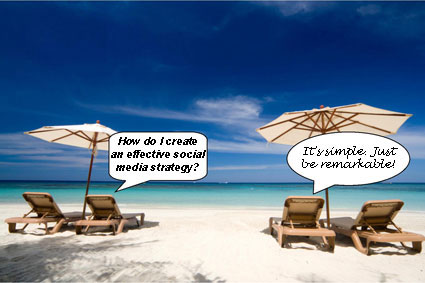“Nothing is so common-place as to wish to be remarkable.“
– William Shakespeare
Finding the answers to hard questions should be easy in a world filled with search engines and social media. After all, the best minds are accessible with just a few clicks. If you want to know about the theory of relativity, a quick search delivers over seven million results. Everything you want to know about Einstein’s concept is ready for your review. There are facts and opinions presented at every intelligence level with a high percentage of consistency in the answers.
But what if you want to know something that is seemingly less complicated like how to create a social media strategy that builds relationships, drives sales, and reduces costs?
A search of “social media strategy” generates 391 million results. It also has facts and opinions but consistency is illusive except for one thing. Being awesome and/or remarkable is consistently presented as a key for success. Adding “remarkable” to the “social media strategy” search delivers 225 million results. Changing “remarkable” to “awesome” pulls 180 million. There are 70 million choices for people who can be remarkable and awesome.
What does being remarkable and awesome really mean?
If we were talking about the theory of relativity, I would suggest that the first person who used the terms to describe it was trying to show the mind blowing power of the concept. I would suggest this because only a fool would venture into the physics world armed only with peacock words. People with real credentials would effectively rally against him or her to put an end to the madness.
Social media is different. A new channel with easy entry combined with high unemployment rates created a perfect storm where everyone and his dog could promote themselves as experts. No education or experience was required. The ability to self-promote and attack anyone who dared to challenge you was the only requirement.
My experience with social media began in 1999 when I started studying online activity for my direct marketing clients. It simultaneously excited and terrified me. The excitement came from the opportunity to personally connect with customers. This was the missing link for my clients that didn’t have stores. The potential for ugliness to spew like Mount Helen on steroids concerned me. I completely missed the biggest danger of all for businesses – people presenting opinion as fact at a price.
Shortly after I became immersed in the social media world, being remarkably awesome became the battle cry for success. In hindsight, I have to admit that it was brilliantly executed and provided an answer for any question that might arise:
How do I get more Twitter followers?
“Be remarkable”
My blog doesn’t get comments. What should I do?
“Be awesome”
How do I attract fans to Facebook?
“Be remarkable”
My company gets comments, likes, plus ones, shares, and we still cannot attribute one sale to social media. What do we need to do?
“Be more awesome”
My car doesn’t start when the weather is cold. What is the problem?
“Be remarkably awesome.”
Okay, the last question may be a stretch, but you get the idea. Ask anything about creating an effective social media strategy and invariably the answer will include something about being remarkable.
This advice has some merit. Companies like Apple, Zappos, and Coca-cola have an existing fan base that thought they were awesome before social media existed. They feed that base regularly by continuing to be interesting. It’s little wonder that there is plenty of conversation about them on social media platforms.
What happens if your business is less than remarkable? Your service is good, products are top quality, and customers are happy, but everything falls in the “normal” category. Can you succeed in a channel that expects “remarkable” activity? Why should you even try?
Before answering those questions, let’s look at what social media is and isn’t:
Social media is:
- A great way to connect with customers. This is especially true for direct marketing and ecommerce companies that have little or no face-to-face contact with the people who support them.
- A way to boost natural search results. There is a “SEO is dying” rumor floating around social media circles that refuses to die. It isn’t true. Search is the still one of the best ways to drive quality traffic to your website. And, now that the major engines are indexing social platforms, you have another way to stay in front of customers and attract new ones.
- A tool to expand your reach exponentially. As your community grows and participates with your activities, the potential audience expands. It is critical that you have a strategy with specific goals to take advantage of this opportunity.
Social media isn’t:
- A replacement for traditional marketing. The platforms are evolving into social commerce, but you still need a point of sale to complete the purchase. The best strategies include an integrated approach that uses all of the marketing tools that fit the company’s market.
- For everyone. Your customers may not be participating at this time so SEO will be the only benefit. You should still consider participating because you want your presence established when your customers do join.
- A short-term solution. It takes time to build a presence and see results. A long time. Expect to spend at least a year providing consistent content before you start seeing a return on your investment. It takes a lot of snowflakes to make a snowball, but once it’s rolling, it grows quickly.
Success in social media is different for every company. Even businesses in the same industry with overlapping communities will see incredible variances. Every organization has a unique personality or corporate culture that is defined by the leadership, employees, and customers. This creates individual perceptions and expectations that affect the experience. Here are some tips to help you succeed:
Start with realistic goals and expectations. While social media has been around for several years, it is still evolving at a rapid pace. It won’t magically morph your business into a super company, but it can help you improve customer relationships.
Have a plan. If you’re just getting started, plan first. If you’ve been at it for a while, make a plan for going forward. (Don’t stop your activity while you plan. You’ll lose traction.) What do you want to accomplish? Connect with customers? Find prospects? Improve website traffic? You can do it all, but you need a strategy. If you’re participating without a plan, how do you know what works or doesn’t? There isn’t a point of reference.
Know your numbers by establishing benchmarks and regularly updating your data. Social media success is hard to measure. You can measure tweets, retweets, likes, and mentions, but none of them come with direct deposit. The purpose of business is to serve customers at a profit. If social media doesn’t contribute, you don’t need to participate. If you have good benchmarks, you can see the effect on the backend.
Be flexible, but stay the course. It takes time to build an interactive community. Social media is changing rapidly. What works today may not be available tomorrow. For example, contests were a good way to attract people to your Facebook community until the terms of service were changed. The platforms make the rules and change them frequently. You have to adapt as needed.
Ignore the noise. There’s a lot of it, loud, persistent, and sometimes ugly. Invariably, you’ll do something that others won’t like and there will be fallout. Here’s a simple rule of thumb to follow: If your customers are unhappy, change what you’re doing. If the social media pundits are unhappy, you’re probably doing something right. Even if it is a mistake, as long as it wasn’t malicious, the fallout will be minimal. Social media bullies have short attention spans.
Be personable but not personal. Everything you do in the social media world should reflect your company’s core values. Chatting about the weather is fine. Leave commenting on world politics to others unless it is part of your business.
Have an exit strategy. Social media isn’t for everyone, but every company should test it. If it works, customers who participate have higher lifetime values and longer lifespans. If it doesn’t, continuing to participate is futile. When you make your plan, define the length of time you’ll test, amount of resources you’ll commit, what defines success, and how you’ll leave if it doesn’t work out.
When someone tells you that all it takes to succeed is being remarkable, remember this: People who are truly remarkable rarely see it in themselves and never talk about it. People who think they are remarkable rarely deliver on the promise.

















Debra,
In social media, it pays to just be yourself and care about being helpful to those who may be watching. Great content is key. Be awesome—and everything else you hope to achieve will definitely fall in to place!